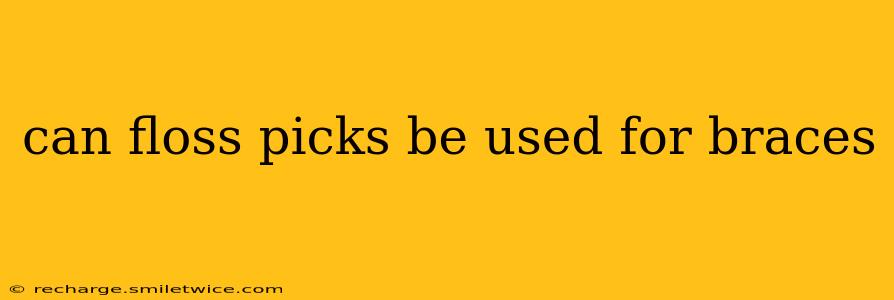Maintaining excellent oral hygiene is crucial, especially when you have braces. Brushing alone isn't enough to remove food particles and plaque trapped in hard-to-reach areas around your brackets and wires. This is where floss picks and other specialized tools come into play. But can floss picks be used for braces? The answer is a qualified yes, but with important considerations.
What are Floss Picks?
Floss picks are small, disposable tools that consist of a plastic handle with a piece of floss stretched between two prongs. They're designed to make flossing easier and more convenient, especially for those with dexterity challenges or who find traditional flossing difficult.
Can You Use Floss Picks with Braces?
Yes, floss picks can be used with braces, but they require a slightly different technique than flossing without braces. Traditional floss is often preferred by orthodontists because it offers more control and can be manipulated more easily to thread under wires. However, floss picks can be a helpful supplementary tool or a suitable alternative for some individuals.
How to Use Floss Picks with Braces
The key is using the correct technique to prevent damaging your braces or gums. Here's a step-by-step guide:
- Gently thread the floss: Carefully slide the floss under the wire, using a back-and-forth motion to avoid snagging. Be patient and avoid forcing the floss, as this could bend or break your wires.
- Curve the floss: Once under the wire, curve the floss around each bracket, creating a “C” shape to hug the bracket and clean the side of the tooth.
- Up and down motion: Gently move the floss up and down against the tooth surface to remove plaque and food particles.
- Repeat: Repeat this process for each tooth, using a fresh section of floss for each tooth.
What are the Advantages of Using Floss Picks with Braces?
- Convenience: Floss picks are easy to use and carry, making them ideal for on-the-go cleaning.
- Improved accessibility: The plastic handle of the floss pick is easier to grip, making flossing more accessible for individuals with limited dexterity.
- Can be more effective than nothing: For those who struggle with traditional flossing, floss picks can be a better alternative than not flossing at all.
What are the Disadvantages of Using Floss Picks with Braces?
- Less precise control: Floss picks may not provide the same level of control as traditional floss, especially when navigating the intricate spaces around braces.
- Potential for damage: If not used correctly, floss picks can snag on the wires or brackets and potentially damage your braces.
- Not as thorough: They might not reach every area around your teeth as effectively as traditional floss, especially below the gum line.
Are Floss Picks Better Than Traditional Floss for Braces?
There is no definitive answer to whether floss picks are "better" than traditional floss for braces. The best option depends on individual preferences, dexterity, and the specific type of braces. Many orthodontists recommend a combination of both, using traditional floss for thorough cleaning and floss picks for convenience when necessary.
What are Some Alternatives to Floss Picks and Traditional Floss for Braces?
- Interdental brushes: These small brushes can effectively clean between teeth and under wires.
- Water flossers: A water flosser uses a stream of water to remove plaque and food particles.
- Super floss: This specialized floss has a stiffened end to aid in threading under the wires.
What Should I Do If My Floss Picks Get Stuck?
If a floss pick gets stuck, do not force it. This could damage your braces or injure your gums. Try gently working it loose with your fingers or using tweezers. If you can't remove it, contact your orthodontist for assistance.
Conclusion:
Floss picks can be a helpful addition to your oral hygiene routine when you have braces, but they aren't a replacement for proper brushing and flossing techniques. Always prioritize thorough cleaning to maintain optimal oral health and the longevity of your braces treatment. Consult your orthodontist for personalized recommendations on the best flossing tools and techniques for your specific situation. Remember, consistent and careful flossing is key to preventing cavities, gum disease, and maintaining a healthy smile throughout your orthodontic treatment.
